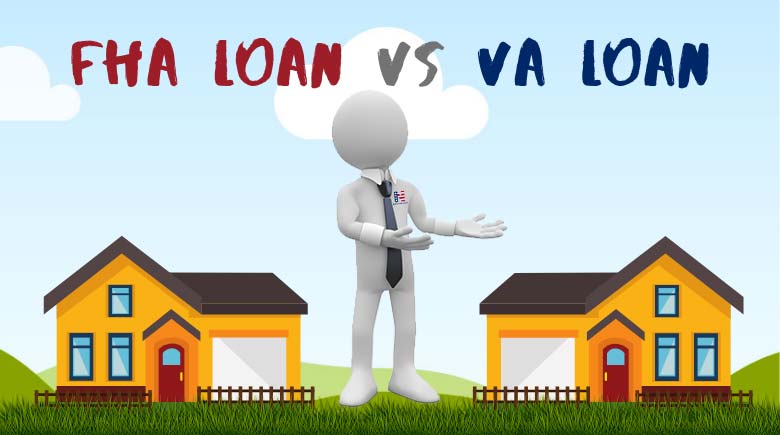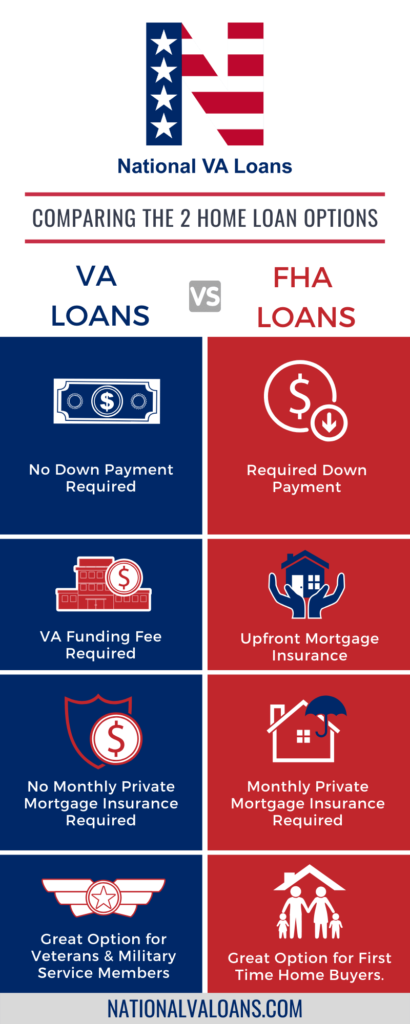Ever wonder what the difference is between an FHA vs VA loan? Buying a house, especially if this is your first time, can be a very intimidating experience. There are so many questions you need to ask yourself. What monthly mortgage payment can I afford? How do I find a good real estate agent? Do I want a 15 year mortgage or a 30 year mortgage, and should it be a fixed rate loan or an adjustable rate loan? Do I need a lawyer? Should I get prequalified before I even start looking? How do I find the best lender? And if you are a current or former member of the military – should I use my VA loan benefits?
That last question is the key. Did you know that there are thousands of veterans out there that don’t even know VA loan benefits exist? And some people have the false belief that there are too many hoops to jump through in order to obtain their VA loan. The truth is that if you find a good lender that has knowledge of the VA loan process, they will walk you through it step by step. But is the VA loan the best option for you? Maybe you are curious about the FHA loan as well – what’s the difference between an FHA vs a VA loan? Which one is right for you, both in the short and long term? We here at National VA Loans have tackled each one of these questions and can help you figure out which program will give you the most benefits.
Let’s take a high-level look at both a VA loan and an FHA loan. An FHA loan is a government program that is open to anyone. A portion of the loan is guaranteed by the Federal Housing Administration. The VA loan is also a government program available only to current and former members of the United States Military. 25% of these loans are backed by the Veteran’s Administration. It’s important to note that the government itself does not actually lend you the money…private lenders do. So with both an FHA and a VA loan, if you are not able to keep up with your mortgage payments, you will go into default and your house will be foreclosed upon. If the bank does not get enough money from the sale of your house to recoup the balance due on the loan, each respective government department (i.e. the Federal Housing Administration and the Veteran’s Administration) will pay the lender to cover some of the loss.
As you can see, with the VA loan option, you save thousands of dollars in up-front costs, not to mention a significant monthly savings. You’ll also have to put out less money on 30 years of accrued interest. If you are eligible, the VA loan is the way to go.
As a veteran, you are able to access 100% of your home equity. Based on the above scenario, you have the option to tap into $64,500 more in cash for less than a $40 per month increase in your mortgage payment. It’s pretty safe to assume which option looks more appealing.
But what about the difference in VA loan requirements vs. FHA loan requirements? Since you need to go through a private lender for both loans, you’ll need to meet the minimum guidelines set by each lender. These guidelines do change depending on which loan you are applying for. Let’s look at the four major ones and how they differ between VA and FHA funding.
- Credit Scores are used as a measure of your overall credit risk. You will need a slightly better credit score to qualify for VA funding vs. an FHA loan. Most lenders will need a minimum credit score of 620 in order to approve you for a VA loan. In contrast, an FHA loan may only require a credit score of 580 or even lower. It’s one of the reasons FHA loans are popular for people with poor or no credit. It’s always a good idea to check your credit score so you know what to expect when you meet with your lender for the first time.
- Debt-to-Income Ratios are also much more relaxed on an FHA loan vs a VA loan. While the Veteran’s Administration recommends a DTI no greater than 41%, an FHA loan can accept a DTI of 43% or even higher in some cases.
- Residual Income is an additional requirement from the VA. They look at your monthly cash flow above and beyond your debt-to-income ratio to get a clearer picture of your finances. This gives them a much more well-rounded picture of your credit worthiness, and is one of the reasons VA loans have such a low default rate. In the end, they want you to be successful in paying for and maintaining your home. The FHA does not have a residual income requirement.
- Eligibility is obviously a major difference between a VA loan and an FHA loan. Who qualifies for an FHA loan? Basically everyone! There is no special requirements for FHA eligibility. But, in order to qualify for a VA home loan, you need to be a veteran, active duty service member or a former/current member of the National Guard or Reserves. For a full list of service requirements, click here.

One of the biggest disadvantages is a result of one of the largest benefits – financing 100% of your home. When you buy a home with no down payment, you own a home that has no equity cushion. You may even be in a negative equity situation if you have financed the funding fee on top of the purchase price. This is all well and good if the value of the home goes up and you stay in the house for a long period of time. But if the housing market goes down, you can wind up in a situation where you owe more on the house than it’s worth. If you then have to sell the house quickly for any number of reasons, you may have to write a check to cover the difference.
Another thing to keep in mind is that a seller sometimes balks at VA financing. They may have the incorrect perception that VA loans are a hassle, take a really long time and are more prone to falling through. If the seller has other people interested that are using conventional financing, they may opt to accept those offers over one that is relying on a VA loan. You can encourage your Real Estate Agent to educate the sellers on how VA loans have become much more streamlined, assuring them that it’s a sound financial option.
You also need to make sure you choose a lender that knows the ins and outs of working through the VA loan process. Not all lenders are created equal, so make sure to do your homework. If you can get some first-hand recommendations from friends, family or other veterans, that’s a great place to start. If that’s not an option, meet with lenders and ask them about their expertise in closing VA home loans. They should be able to give you an idea of what percentage of their loans are VA loans, what documents you’ll need to provide and walk you through the steps. If you have any doubts about their ability, don’t be afraid to look elsewhere.
The VA home loan is one of the best benefits available to you as a current or former member of the US Military. There’s no doubt that the benefits far outweigh the potential drawbacks. As long as you meet the eligibility requirements and qualify with the lender, it’s definitely the way to go. However, if you have a low credit score or a high debt-to-income ratio, an FHA loan may be a better option for you. If you have questions about the FHA vs VA loan or anything in this article, give us a call now at 855-956-4040 to talk with a VA home loan specialist. Thank you for visiting us today, and we thank you for your service.







Leave a Reply
Your email is safe with us.